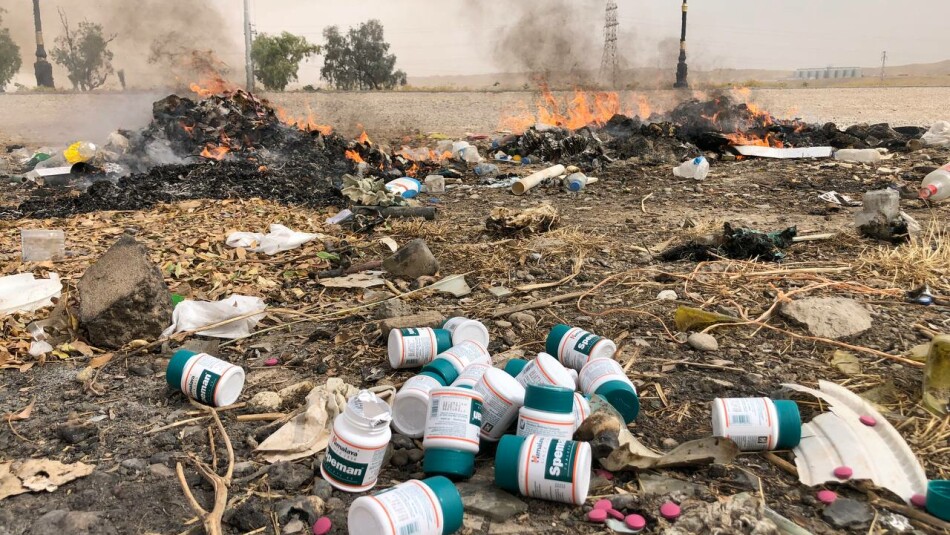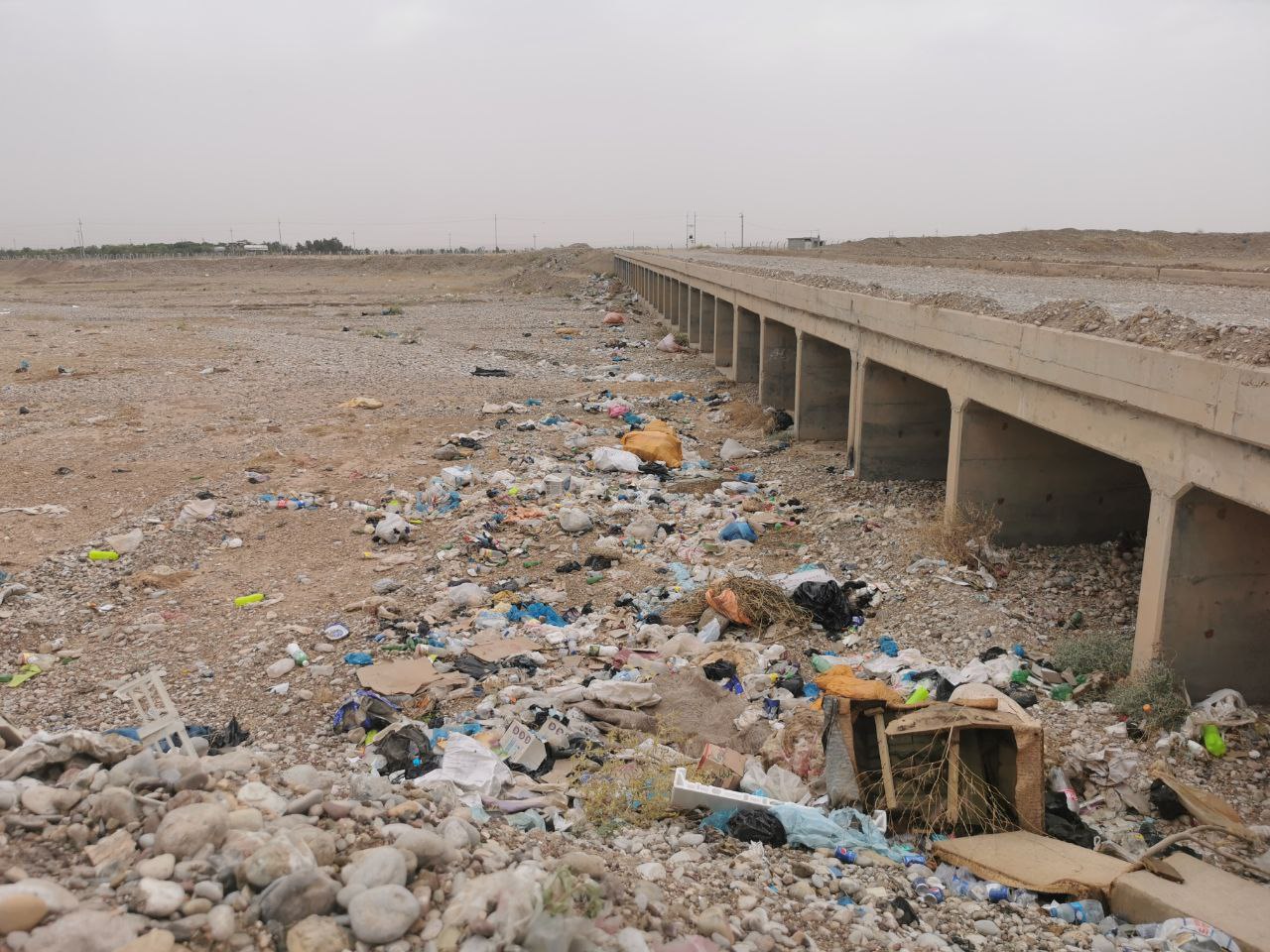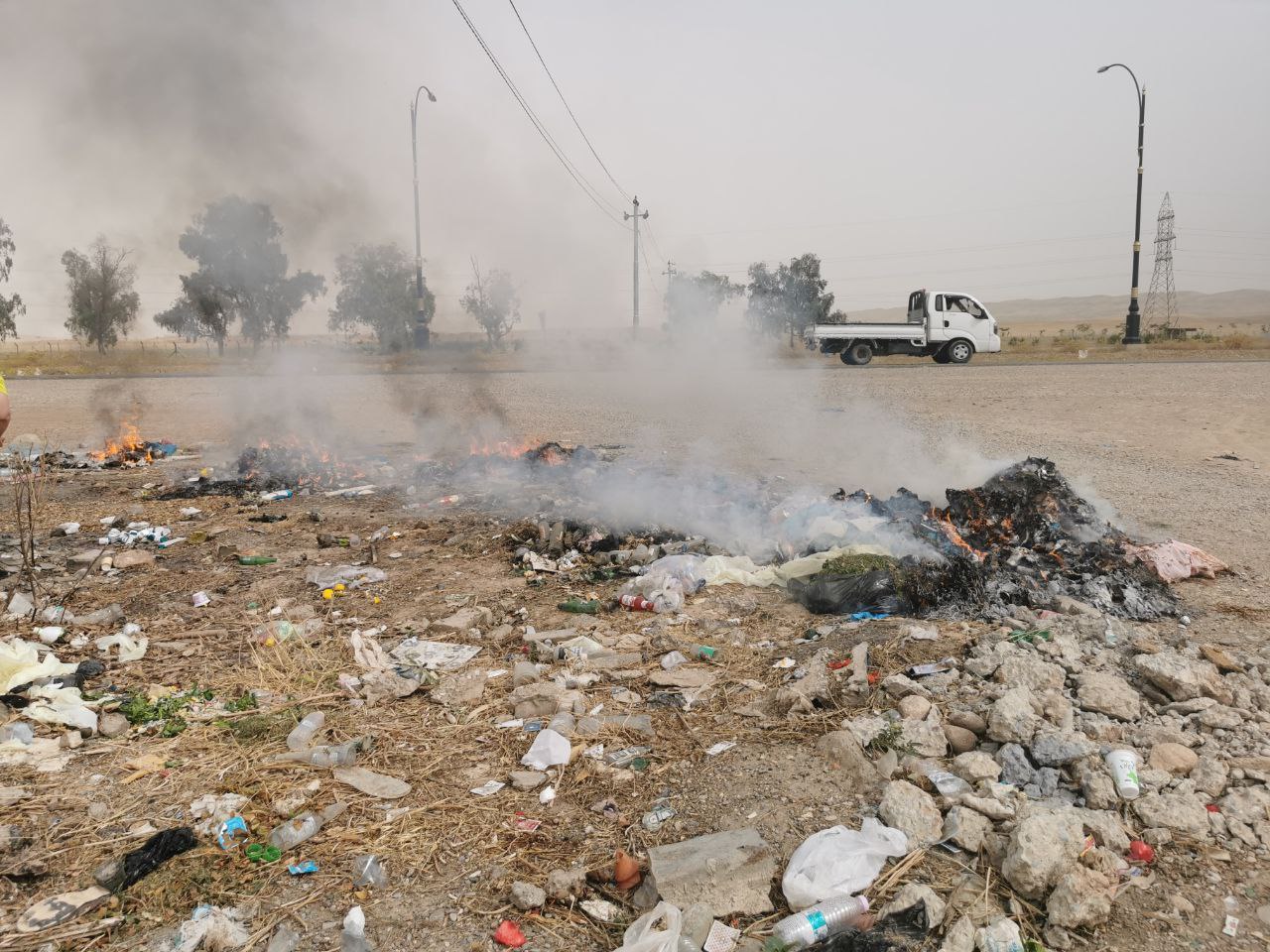
The spread of flies and worms on dead animals and mixing of waste with drinking water sources, burning garbage, dense smoke and an unpleasant smell are some of the scenes that spread daily over the villages of Garmian administration in Sulaymaniyah Northern Province.
Garbage collection companies have reduced the number of garbage collection activities in Garmian province due to restrictions in payments, while piles of litter double the threat to water resources and the entire environment in the region.
Dalia Ahmad, a resident of Tazede village in Kalar, said the companies visit her village every two weeks, causing dust and garbage to fill the village. “Some throw the garbage into the village stream; some burn it and the smoke comes into the village.”
Ahmad, whose four-year-old son and sister have respiratory diseases and asthma, says they find it difficult to breathe when the smoke returns to their village.
Tazede is located on the Sirwan River, 15 minutes’ drive from Kalar, the headquarters of Garmian administration. The village consists of 300 households and has a seasonal spring where garbage is collected by the villagers, though it is one of the sources of water that ends into Sirwan River.
"Half of the households in this village drive their garbage into the stream. In winter, the water of the stream mixes directly with the Sirwan River, which is the main source of water for drinking and agriculture in the region.”
Some of the villagers pile garbage and burn it when there is no adequate garbage collection service.
Half of the households in this village drive their garbage into the stream
"I have had several fights with the villagers saying that my son is sick and when they burn the garbage, he cannot breathe because of the smoke," she said.
Iraq produces around 30,000 tons of solid waste every day, says the United Nations Developing Program UNDP Iraq in a report out in June 2022. “The country lacks real waste management infrastructure to dispose this waste in a proper way that ensures no negative environmental nor health effects, therefore, most of it gets disposed in unregulated landfills.”

In general, the data of garbage in Garmian administration is increasing unexpectedly, which is in parallel with the fact that it is not collected and destroyed scientifically.
In 2014, less than 150 tons of garbage was collected daily in Garmian, but according to statistics from the Garmian municipality and the garbage collection local company, in 2022 it has increased to 450 tons per day.
Despite the increase, the company that was awarded the contract to collect garbage in Garmian, says it cannot collect such a quantity every day, due to lack of money by the government.
Barzan Fayeq, head of the high committee for garbage collection in Garmian administration, said, “According to our contract with Gardin company must clean the neighborhoods in the cities every other day, 350 tons of garbage is collected daily. It was 450 tons.”
Gardin Company has a contract with the municipalities of Garmian until August 2024, but the Kurdistan Regional Government KRG is not spending enough money for it, so the Patriotic Union of Kurdistan PUK led by Bafel Talabani will pay the company in order to not to stop its work.
Although Garmian villagers say the villages are cleaned twice a month, Fayeq said, "Our agreement with the company is to go to the villages near the paved roads twice a week.
Garmian (local) Administration which includes Kalar, Kafri and Darbandikhan districts, with dozens of sub-districts and thousands of villages between Sulaymaniyah and Diyala province, is part of Sulaymaniyah, one of the provinces of the Iraqi Kurdistan Region IKR under the KRG.
Jawana Mohammed, a resident of Sayed Khalil village, which consists of 24 families, said: “No garbage has been collected in this village for three years. They used to come once a week but now garbage covers the village since it is spread by wind toward the main street and city center.”
Sayed Khalil village has two streams, one of which flows through the middle of the village and villagers dumps garbage into it.
All the garbage has accumulated in the stream, flies and mosquitoes, animal waste and plastic are mixed up
“All the garbage has accumulated in the stream, beaten by flies, animal waste and plastic are mixed up and sometimes set on fire... Heavy rains have carried all the garbage into the Sirwan River several times,” said Mohammed.
Despite the difficulties the country faces when it comes to waste management, UNDP Iraq a s part of the peer-to-peer component of UNDP’s Supporting Recovery and Stability in Iraq through Local Development program, funded by the European Union EU, two waste management projects are being implemented in Nineveh and Thiqar provinces as a partnership between the European peer: PIN Prato of Prato Italy and the local authorities.
Haji Ali, a villager, explains villagers are obliged to brun garbage in absence of collection services.
Similar projects have been implemented throughout Iraq already. Ecocem is a waste treatment plant in Sulaymaniyah. This plant uses collected waste to produce refuse-derived fuel (RDF) which is used to run cement factories.
Dilêr Hidayat, supervisor of Gardin garbage cleaning company, told KirkukNow: “The government has not spent any money on us for a year and a half so we have abandoned the villages and neglected them. They can bury the garbage underground.”
"According to our contract, we clean the city every other day, but we feel it is not successful because a lot of garbage accumulates, so we decided to clean the city every day ... Now we have a program to collect garbage from villages close to the main street (of Kalar).”
The company official says that if they clean the garbage in the villages, they will have to collect another 50 tons a day.
The population of Garmian is 324,000, according to the Garmian statistics office.
Fayeq, head of the high committee for garbage collection in Garmian administration, said that as a temporary solution, cleaning campaigns are occasionally carried out for the areas where people throw garbage.

Abdulmuttalib Rafat, an expert in environment and water resources, believes that garbage is not collected and destroyed scientifically in Garmian. "They must be destroyed 10 km away from the cities while the landfill of Kalar is only 2 km away from the city."
“In Garmian, most of the garbage dumps are built in streams and rivers, which causes the waste to be transferred into the rivers during the rainy season,” he added.
“Environmental protection conditions are not observed in Garmian. This is a violation by the government and they are responsible for what is happening. For example, garbage is burned, which causes the release of dangerous gases and groundwater... all of these have an impact on the environment and human health.”
Garmian municipalities have received approval to receive 10 hectares of land to be used as landfill, and the process is currently in the tendering stage, according to the head of the high committee for garbage collection in Garmian administration.
"The best way to treat waste is to separate it at home as facilitation for cleaning companies and establish more recycling plants and companies for this purpose, thus protecting the environment, water, soil and air," Rafat said.